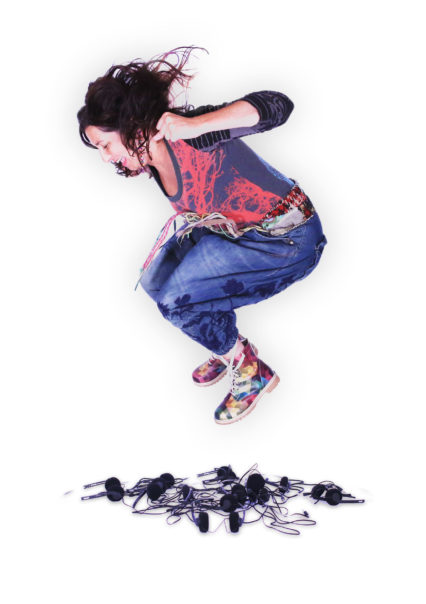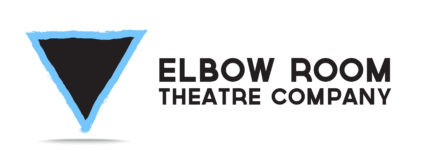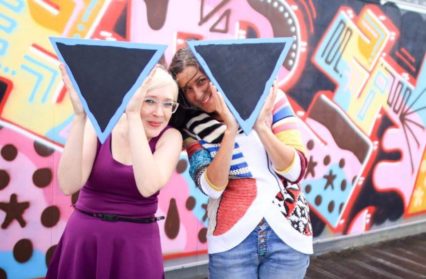Chloë Clarke is a Cardiff-based theatre-maker and audio description consultant. Frustrated at the lack of decent audio description on offer to her as a visually impaired audience member, she decided to do something about it. In 2015, she got an R&D award from Unlimited, the UK’s leading commissioner of disabled artists, which is administered by Shape and Arts admin. Joe Turnbull caught up with her ahead of a sharing of the resulting production, The Importance of Being Described…Earnestly? At Wales Millennium Centre on 7 December.
This article was produced in partnership with Disability Arts Online.
 Joe Turnbull: What’s your background in theatre?
Joe Turnbull: What’s your background in theatre?
Chloë Clarke: I trained as an actor/musician and I’ve been working for about nine years. Recently, I started to make my own work, thanks to Unlimited. It was suggested to me that I apply for one of their R&D awards two years ago. I didn’t think in a million years that I would get it. But it turns out that they were really keen on the idea I had, which was all about audio description. This year, I got a second R&D award from them to develop the project further, and it’s now in its final phase of R&D.
Joe Turnbull: What made you want to shift from acting into directing and making your own work?
Chloë Clarke: I love performing, but as a disabled artist I just don’t think the platforms are there. The disability arts sector is fantastic and there are lots of opportunities within it. But branching out into what we might call the ‘mainstream’ is a real struggle. Integration is something I think is key in general. I don’t think there should be two separate sectors. I’d really like to see a shift in the representation of disability across all art sectors.
So, I decided to try and boost representation of disabled artists. But also, as a visually impaired audience member – and that’s where this project comes in – I have always been really frustrated by what I think of as traditional audio description. As a young theatre-goer I would never have opted in for it, I would always just ask my friends or family to tell me what was going on.
Joe Turnbull: What is that you find so problematic with ‘traditional’ audio description?
Chloë Clarke: Particularly when I was younger, I didn’t like feeling so conspicuous with a headset on, and feeling singled out from everyone else. That was a more superficial aspect. But what really frustrates me is that it isolates me from the people I’m with. I generally go to the theatre with people.
Joe Turnbull: Yes, it’s a social activity for most people, isn’t it?
Chloë Clarke: Exactly. Equally though, it’s frustrating that I couldn’t go on my own, because generally I rely on the people I’m with to describe the detail to me. There are very few audio-described shows, especially in Cardiff. If I wanted to go on my own, I wouldn’t have access to most shows, unless I asked a stranger next to me to tell me what’s going on!
From an artistic perspective, with traditional audio description, there’s the fact that you only get one person’s interpretation of what’s in front of you. However much they try, that is never going to be objective.
Joe Turnbull: So how has that influenced your own ideas about providing more creative audio description?
Chloë Clarke: I started thinking about the idea of what it would be like if you eschewed that idea of objectivity – get rid of it, it’s pointless – and instead go super subjective, but from multiple perspectives. So, you get a choice of which you follow and who you rely on more – that gives you a more 3D idea of what’s in front you.
Joe Turnbull: You’ve had two Unlimited R&D commissions for The Importance of Being Described…Earnestly? Can you explain a bit about how the project has developed?
Chloë Clarke: It’s been a really interesting and unique process. We started in 2015 with a basic idea of what I wanted and brought together six actors and the writer, Jimmy Whitaker and we devised a piece in a two-week period. That was based on a vague premise of a fictional theatre company putting on an open rehearsal for an inclusive piece of theatre. Out of a load of workshops and improvisations came some brilliant characters and nice ideas. From that, Jimmy put together a script, which we then workshopped. Then we added some audio-description on top of that, creating another script. That was the outcome of our first Unlimited R&D which had a sharing in March 2016.
Since then, during the second Unlimited R&D, Jimmy has taken on the feedback we gained from that and developed it further. A second audio-description script was written by professional Audio Describer Alastair Sill, alongside the workshopping, then integrated into Jimmy’s main script. We also had a separate audio description consultant give feedback on that amalgamated script. It’s literally been layer upon layer of devising, script and audio-description over and over again.
Joe Turnbull: The Importance of Being Described… Earnestly? is billed as a comedy. Why did you choose that approach?
Chloë Clarke: It was always going to be a comedy in my mind from the outset, because I think it’s the best tool for bringing audiences together. What I wanted to do was have a mixed disabled and non-disabled audience. I wanted the audio description to enhance the experience for everyone, equally. I just feel that comedy is the best vehicle for that. Originally, we were going to try and make this a farce about audio description, and it organically evolved away from that. I think there’s a uniting element in laughter, and that’s mainly what we’re trying to achieve with the show.
Equally though, as a visually impaired audience member, I know that the moments in which you feel the most excluded are those when you feel the rest of the audience has got a joke you haven’t had access to. Humour, especially visual humour, is one of the hardest things to describe without compromising the joke for the non-visually impaired audience, so I was particularly keen to tackle this issue of getting the joke across to everyone at the same time, without ruining it.
Joe Turnbull: What can the creative use of audio description give any production?
Chloë Clarke: I believe that all art should be accessible for all. In an ideal world, it would be considered in every production, from the outset. It has to be seen as an artistic, creative opportunity – not as something that inhibits the creative process, which is how I think it is seen now. Attitudes are gradually starting to shift. It’s just a creative tool like any other. There are so many exciting pathways to explore with it, and that’s what I hope this piece will do – open people’s eyes to that. It’s just about thinking outside the box, the things that we are supposed to do as artists anyway; audio description is just another tool in your toolbox.
 Joe Turnbull: You recently set up a new theatre company based in Wales called Elbow Room. Can you tell us about what the motivation for that was and what you’re hoping to achieve?
Joe Turnbull: You recently set up a new theatre company based in Wales called Elbow Room. Can you tell us about what the motivation for that was and what you’re hoping to achieve?
Chloë Clarke: Elbow Room was set up by myself and Sami Thorpe who is an actor and sign language interpreter. We both feel there’s not enough representation of disability in theatre, particularly in Wales. There’s lots of willingness, but in terms of action I think we’re a way behind both England and Scotland. Our intention is to produce new writing that incorporates creative access from the very beginning. Doing our first production, The Importance of Being Described…Earnestly? it has really hit home that the accessibility needs to be thought of from the outset – at the writing stage. What we’re essentially about is providing a platform and a true representation of disabled and other marginalised groups of people – in an edgy young-ish way. Yes, it’s about access and inclusion but it’s also about making high-quality theatre.
Joe Turnbull: What’s the future for The Importance of Being Described…Earnestly? beyond the sharing at Wales Millennium Centre?
Chloë Clarke: We’re hoping to take it on a premiering tour in Autumn/Winter 2018, ideally commencing at the Unlimited Festival at Southbank Centre in September. Rather than target a wide array of venues, we want to cultivate a handful of strong relationships – we’ve already had interest from some high-profile venues. If that goes well, we’ll take it on a further tour beyond that. I want to push it as far as it can go!
Joe Turnbull is a contributor to Wales Arts Review.












